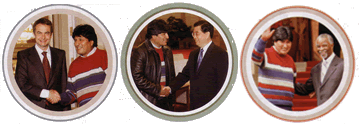I've just read my comrade ranc's blog about hypocrisy. It's an interesting question, as he states in the first paragraph :
Why do people (politicians and ordinary folks alike) pretend to be publicly spritied and appeal to collective interests in private arguments and public discourses, when often times it is a piece of common knowledge that they are really motivated exclusively by self-interests? If we accept the standard operational assumption of rationality in economics (and political science), why can't people just tell each other what they really want for themselves and strike a honest bargain? Yes it would be a naked bargain, but why pretending to be clothed if all know that all are naked? This is especially bewildering since the truth revelation principle tells us that no outcome can be better than having each other revealing their true types. In a word, why hypocrisy?
He gives several plausible answers and has a thoughtful discussion. But I feel that those answers are not very "neat" in rationalist sense because most of them invoke theories and assumptions from other intellectual traditions ( and sociological one, in particular). According to those hard-core social scientists and followers of Lakatos, solving a problem in this way is theoretically degenerative.
Actually, I don't think this question is difficult for rationalists. Although often times it is a piece of common knowledge that politicians are really motivated exclusively by self-interests, it does not rule out the possibility that the interests of some politicians are "accidentally" identical with that of the median voter. Let's think about the following one-shot game scenario: 1) the public is unclear about a candidate's real preference; 2) the candidate's preference may or may not be idnetical with the median voter; 3) To claim that his preference is the same as the median voter weakly dominates telling the truth because it gives the candidate better chance to win the election. It weakly dominates becaues the public may not believe the claim is informative.
In a different scenario, say, a repeated game. Hypocrisy can be viewed as an investment of reputation. In order to get a better chance to be trusted and thus gain more in the future, a politician may speak and act in accordance with public interests that are quite different from his own in the first stage. And later on, after he is trusted or re-elected, he may take advantage of the trust or position and satisfy his own real desire.
There are many examples in history which indicate the logic above. Han Feizi may be an example for the first scenario; while Wang Mang is for the second.
